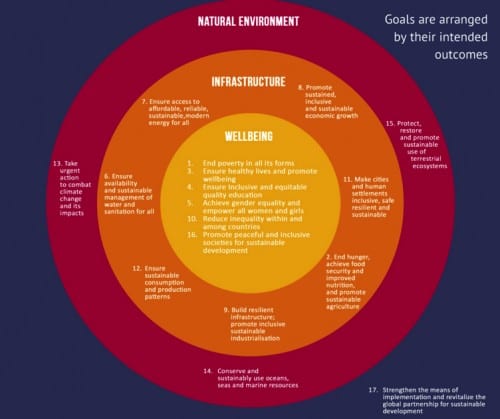Thinking beyond sectors for sustainable development: How to make sustainable development happen
By ucyow3c, on 8 July 2015
![]() Written by Lucien Georgeson (UCL Geography)
Written by Lucien Georgeson (UCL Geography)
We have to break out of the silos; it’s clear that the success of the Sustainable Development Goals (SDGs) will depend on effective cross-sectoral governance and institutions. That is the powerful conclusion of a new book, Thinking Beyond Sectors for Sustainable Development, launched on Wednesday by UCL Grand Challenges and the London International Development Centre (LIDC).
Thinking Beyond Sectors examines the 17 Sustainable Development Goals and analyses the complex interactions between them. The main concept (see diagram below) is that the goals exist at three levels: ‘Well-being’, ‘Infrastructure’ and ‘Environment’, and we must understand the complex interactions between and within all levels. Now that the SDGs and their targets are more or less decided, the big issue for the coming year is the challenge of designing institutions and governance structures to actually implement the SDGs.

The ‘Levels’ of the Thinking Beyond Sectors approach
At the launch on Wednesday, authors and editors of Thinking Beyond Sectors were joined by two guest speakers: Claire Melamed, Director of Growth, Poverty and Inequality at the Overseas Development Institute (ODI), and Anna Thomas, Head of Policy Research at ActionAid.
Melamed spoke of the need to switch to new questions about the SDGs. We must work out what should happen in any given country to get from the launch of the SDGs at the UN General Assembly in September, to positive changes for someone living in that country. She also presented the findings of an ODI study into the gaps between existing national targets and where countries should be aiming with the SDGs. The picture is clear; in the areas that are politically difficult, where vested interests exist, implementation of the SDG agenda will be most difficult.
Thomas spoke of ActionAid’s experience in delivering a human rights-based approach to development that supports the empowerment of communities – an important model for SDG implementation to take note of. She also warned of the need to avoid narrow, technical approaches, echoing the conclusions of Thinking Beyond Sectors that broader thinking is required.
One of the book’s editors, Jeff Waage, Director of LIDC, then described the key messages from Thinking Beyond Sectors. Waage highlighted the need to focus on the middle of the three levels – ‘Infrastructure’ – when it comes to creating the right governance structures, as it will impact both the environment and efforts to improve individual and collective well-being.

Wednesday’s launch concluded with a panel of authors of Thinking Beyond Sectors, spanning multiple institutions and disciplines: from education to engineering, via political science, climate change, and disaster and risk reduction. Sarah Ball (UCL Civil, Environmental & Geomatic Engineering) demonstrated how the SDGs are a huge improvement on the Millennium Development Goals when it comes to water, but the water SDG perfectly demonstrates the ‘nexus’ problem. Water technologies need energy, we need water for food, and energy for irrigation. The new SDG agenda presents complex interactions and complicated challenges.
David Hudson (UCL Political Science) reminded us that ‘governance’ is a way of talking about politics without using the word, but politics is a key part of making the SDGs a reality. Ilan Kelman (UCL Risk & Disaster Reduction and UCL Global Health) spoke with clarity of the need for the climate change goals to work in tandem with everything else; we cannot separate climate change from things like water, or reducing disaster risk, but currently we do. We also cannot separate the technical actions we must take from the broader concepts like justice, access and equality that are also key to sustainable development.
Finally, Susannah Mayhew (London School of Hygiene & Tropical Medicine) presented a powerful case study from Thinking Beyond Sectors‘ final chapter, studying the interactions of two ‘inner level’ goals; Health and Education. Although there are many claimed links between the two, the available data does not necessarily help us understand the genuine interactions between projects to improve health or education. Mayhew highlighted that health and education are two powerful sectors with strong claims to protect public goods, but also a strong desire to protect their own power structures. Is it possible to break these down to create more effective development initiatives? She also warned against the rising influence of powerful lobbies from profit-driven organisations in both health and education.
By the end of Wednesday’s launch event, it became clear that the success of the SDGs will depend on effective, cross-sectoral institutions and governance structures. As the SDGs come into effect from 1 January 2016, as long as we avoid duplicating efforts where existing institutions can be adapted, we have the time and the opportunity to build these now. This is key to making sure that the SDGs deliver the best possible outcomes over the next 15 years.
 Close
Close

